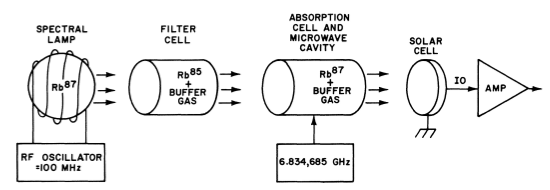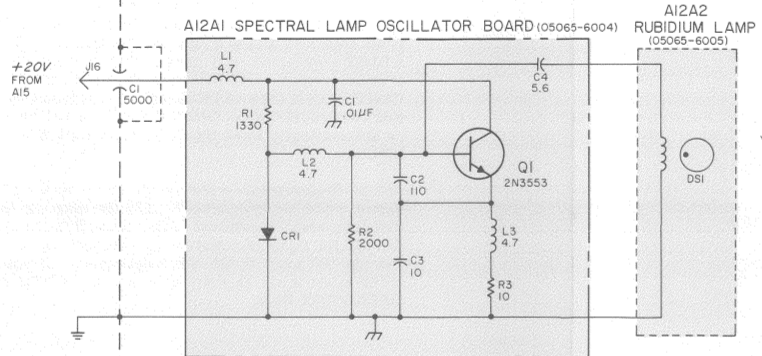Lamp Measurements¶
The first step in the physics package is a Rb87 lamp which is excited by a RF field:

The RF field is generated by a single transistor:

Which is supplied from the +20V rail with a little bit of extra filtering:

Frequency¶
It is an obvious question to ask what happens if we vary the lamp voltage:
And the answer is that the frequency generally shifts 1.5e-11 {s/s*V}
To reduce the lamps influence to below 1e-14 {s/s} it needs a power supply with less noise than:
1e-14 {s/s} / 1.5e-11 {s/s*V} = 666 {µV}
My measurements indicate that the noise on the +20V rail is in the order of 50 {µV} so that shouldn’t be an issue.
Something clearly happens around 20.1 {V}, it looks like a tipping point where the frequency drops.
Stability¶
I ran each lamp voltage for two hours, in order to spot if there were any temperature effects, that gives us enough data for a ADEV calculation:
Clearly not enough data…
Power¶
The lamp draws 3 {W} electrical power, and since it is inside the oven, the oven draws less power if the lamp power increases:
(Increasing lamp power is downwards to make it easier to see.)
Conclusion¶
Given the relatively modest power supply noise requirement, it might make sense to tune the frequency to the SI-Second with the lamp voltage rather than the horribly sensitive C-field solenoid.
That raises the question of why the lamp voltage affects frequency to begin with, and while I can formulate theories, I have no idea how to test them:
Temperature
Lamp intensity
RF field mixing with microwave field
Magnetic field from power flow
The first three can conceiveably affect stability:
Change oven dynamics
Stability of light intensity
RF field frequency stability
The obvious “more research” thing to do, would be to run some much longer time series at different voltages, to see if there is any impact on stability.
phk
